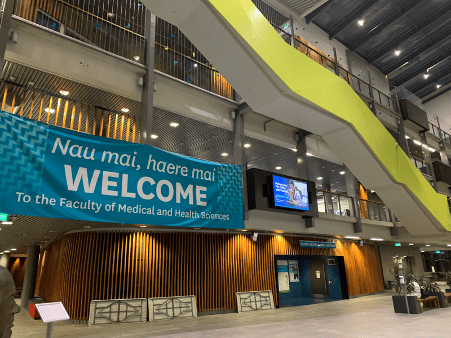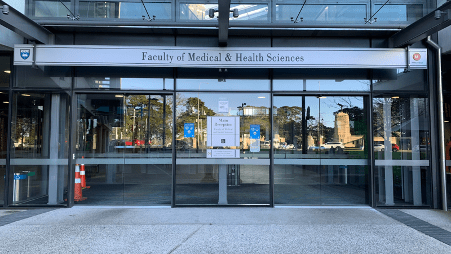I have cut the fat and gone straight to the meat to outline all you need to know for entering medical school at the University of Auckland. Read until the end.

The dream campus.
Overview of the three entry pathways:
- First year Bachelor of Science (Biomedical Science) – BioMed
- First year Bachelor of Health Sciences – BHSc
- Graduate entry (any programme)
The first 2 pathways are known collectively as overlapping first year (OLY1). The reason is that to enter medical school through these two pathways, the grades (GPA) from the four common courses shared between both BioMed and BHSc will be included in determining the applicants’ final ranking. These are known as the four core courses and will be in bold below.
1. First year Bachelor of Science (Biomedical Science) – BioMed
- Historically, and still is, the most common entry pathway into Auckland medical school. It is also the pathway I personally went through.
- CHEM 110, BIOSCI 107, POPLHTLH 111, GENERAL EDUCATION, MEDSCI 142, BIOSCI 101, BIOSCI 106, PHYSICS 160.
- Science-heavy with lots of labs
- Non-core courses take up less time and are relatively easier to tackle if you have background in year 13 triple sciences, especially physics
2. First year Bachelor of Health Sciences – BHSc
- More commonly chosen for those who are open to more alternative healthcare careers due to the nature of its courses being public health focussed.
- CHEM 110, BIOSCI 107, POPLHTLH 111, POPLHLTH 101, MEDSCI 142, POPLHTLH 102, HLTHPSYCH 122, GENERAL EDUCATION
- Population-health-heavy with lots of essays
- Non-core courses takes up more time
Rank score for enrolment from high school into both courses can be found on University of Auckland website.
3. Graduate entry
- Historically it is the less common entry pathway. However, in recent years there has been speculation that the university is moving towards favouring more graduate applicants.
- Courses taken are degree dependent and are all taken into account for GPA
- You may need to undertake and pass some or all of the OLY1 courses before commencing Part II.
- Opens up alternative career options and may provide you with valuable research/ life experience (depending on your previous degree)
The bars to entry::
- Grades (GPA) – 60% – 15% per core course, for OLY1 applicants
- UCAT ANZ – 15%
- Multiple-Mini interview (MMI) – 25%
Entry into the MBChB is limited and competitive (directly quoted from the University of Auckland website). The rest of this blog will be focussed on entering Auckland medical school from OLY1; and if you’re a graduate, the UCAT and MMI information will also be applicable.
Every year there are 1000+ undergraduate OLY1 students from the general category (that is if you do not have rural or MAPAS or low social-economic background i.e alternative categories). In recent years only less than 100 of them are accepted into part II MBChB every year, due to more graduate applicants being accepted and the medical school allocating more seats to the alternative category students. The overall acceptance rate for OLY1 general category applicants is therefore, realistically, less than 10%.
- GPA
Let’s first talk about some statistics. Data obtained from the University – go check out fyi.org.nz if you want exact numbers – has shown that historically (prior to the COVID weirdness) the median core GPA of the accepted MBChB applicants from OLY1 was around 8.75. This means that you need to attain at least 3 A+s and 1 A in your 4 core courses (CHEM 110, BIOSCI 107, POPLHTLH 111, MEDSCI 142) to have a decent shot at getting accepted into medical school, because your UCAT and interview results might not be as predictable compared to GPA.
Strategically, if you want to be ‘safe in the game’, it is almost undisputable that you will need to aim for all A+s in your semester one core courses. This is because CHEM 110, BIOSCI 107, POPLHTLH 111 are all in semester one, and while MEDSCI 142 is in semester 2, it is actually the hardest course of the year and usually less than 5% of the class gets A+ for it. Therefore, if you are going into semester 2 with a perfect 9.0 core GPA, you will be much more relaxed and at a huge strategic and psychological advantage in terms of studying.
Now don’t forget about your non-core courses. For the purpose of reserving the option of going for graduate entry if you don’t make it in OLY1, you should still aim for as high as possible for your non core GPA because all grades from the courses of your qualifying degree over the 3 years are included in the final GPA. In theory, they can be as low as C+ average if you managed to attain A+ for all 4 of your core courses, just to meet the minimum eligible GPA (6.0). So, for those who are going all in for first year entry, you should not focus too heavily on your non core courses.
Bear in mind that failing any single course makes you ineligible for consideration in the MBChB application.
2. UCAT ANZ
The detailed information regarding scoring and format can be found on the UCAT ANZ official website. Here are some brief summaries:
- UCAT ANZ is a computer-based test delivered in Pearson VUE test centres (directly quoted from the UCAT ANZ website).
- Comprises 5 sections which are individually timed.
- Verbal Reasoning, Decision Making, Quantitative Reasoning, Abstract Reasoning, Situational Judgement
- From experience, the Verbal Reasoning section is generally the hardest section to improve due to the reliance on critical/ speed reading skills
- Students often underestimate the importance of UCAT in the final ranking. 15% is equivalent to a core course like MEDSCI 142, and when everyone has a GPA of 8.75 or 9.0, an outstanding UCAT score can help pull you ahead.
- For Auckland medical school, due to the consistently poor UCAT performance of applicants – again go check out fyi.org.nz for exact numbers – my personal opinion is that given a strong GPA, scoring around 80th %tile is enough to not hold you back.
3. Multiple-Mini interview (MMI)
- 8 stations, 7 will be assessed, 1 station will be used for checks related to Police Vetting and for the candidate to rest.
- Traditionally there is always a Hauora Māori/ inequity question, a medical ethics question, a learning/ life experience question and an acting station. Sometimes there would also be questions on current affairs related to the medical field, E.g. end of life choice act from the 2019 MMI; or even societal issues.
- You have to be genuine while also saying things that the interviewers want to hear; But don’t lie, it is very bad if it’s picked up.
- Ironically everything you’re being interviewed for will be taught at medical school; retrospectively, I feel like if I were to retake the MMI now I would have smashed it effortlessly!
All the best for you aspiring Doctors. I look forward to working with you in the future.

Grafton campus.